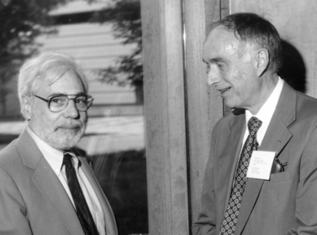|

Bearings
Friday, May 8, 1998
1:00-1:45 pm
Speakers: David Thorburn and Lloyd Morrisett

[These are edited summaries, not complete transcripts.]
Web of Paradox
[The complete text of David Thorburn's paper is also available.]
David Thorburn: "My title intends a double provocation: to recognize the contradictory, the
ambiguous aspects of the World Wide Web; and to sharpen our awareness of
the Web as a thing made of language and of history, a Web of Metaphor."
The Internet encourages joining, sharing, the creation of communities of interest, Thorburn said, "but to accomplish these interactions, we
must sit, solitary, at the computer keyboard, interfacing deeply
not with a human other but with Windows 95." Moreover,
the web is also congenial to our uncivic preferences for "isolation, the
avoidance of human contact, solipsism, 'lurking', voyeurism."
| |
| |
These contradictions or paradoxes are implied in the way in which the
adjective "virtual" qualifies and complicates our sense of the Web's power:
virtual environment, virtual community, virtual reality.
But it is an error to assume that these profound paradoxes are uniquely
modern. The experience of virtuality, our power to imagine and to
experience an "unreal" space of possibility and potentiality, has always
been a central feature of human life. The blurring or joining of such
categories as "real" and "artificial" or "near" and "far" or "public" yet
also "private" is a defining feature not only of cyberspace but also of our
experience of the movies, of television, and even of reading.
|
|
Technologies of Freedom?
[The complete text of Lloyd Morrisett's paper is also available.]
Lloyd Morrisett: All of us have been shaped by the communications technologies that permeate our lives -the printing press, radio, television, and telephone.
These technologies have been, in Ithiel Pool's phrase, "Technologies of Freedom." But these broadcast technologies also exercise a benevolent tyranny over us by favoring passive reception of information over thoughtful reaction, while the telephone favors immediate response over considered and deliberative response.
It is significant that we are called the "information society"--not the thinking or deliberative society. We are fortunate that the tyranny has been benevolent and that, despite the decline of the habits of mind that are associated with reason and rationality, we have remained a constitutional democracy.
| |
| |
Just as the printing press, then radio, and finally television were technologies of freedom in their time, computer communications and E-mail can be a technology of freedom today and in the future. Just as
those earlier technologies carried with them dangers to freedom, so will the Internet.
The powers of propaganda and demagoguery are dangers inherent in the new electronic technology. It is too easy for manipulation to be substituted for education, for advertising to replace careful information-gathering. Reasoned debate and deliberation may be overridden by the adrenaline of an immediate reaction in which minority views may be obliterated by the voice of the crowd.
"The dangers of propaganda and demagoguery suggest the characteristics that are needed to define democratic uses of new interactive information technologies and the Internet and make them true technologies of freedom.
Requirements for at least six important features must be taken into account: access, information,
discussion, deliberation, choice, and action."
Of these, perhaps the most important requirement is access. "A national system of interactive technology for consideration of important issues" is one key to extending the democratic potential of digital media. "If well designed, such a system can counter divisive trends and help bring the nation together." If we wish to exploit the democratic and civic potential of interactive information technologies, we must find ways to create access to such a system for all members of our growing and diverse population.
|
|